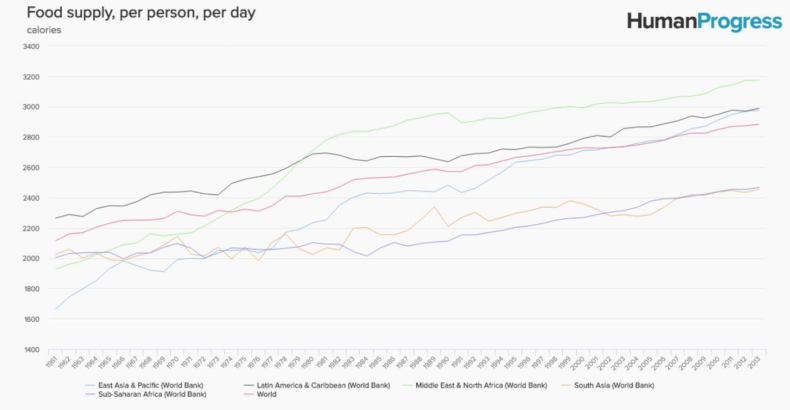In confronting the problem of global hunger, Western activists, planners, and foreign aid “experts” are prone to look only toward various forms of economic redistribution. Even among nonprofits, churches, and missions organizations, we see an overly narrow focus on temporary needs and material donations with little attention to individual empowerment and institutional reforms.
Meanwhile, global poverty and hunger are on the decline—a development driven not by top-level tweaks and materialistic trickery, but by a bottom-up revolution of freedom, innovation, and human connection.
Indeed, far from the famines predicted by the economist soothsayers of yore, food access and food security have been growing steadily across the world for nearly a century. As for the famines we do encounter, the primary causes are not overpopulation or environmental scarcity, but despotic authoritarianism and its attempts to micromanage the human spirit.
In an article for CapX, Marian Tupy highlights the progress of the past half-century, and why we should be optimistic about the continued decrease of global hunger.
“In sub-Saharan Africa, food supply rose from 2,004 calories in 1961 to 2,465 calories in 2013,” Tupy explains. “Put differently, the world’s poorest region now enjoys access to food that is roughly equivalent to that of the Portuguese in the early 1960s. In fact, scientists from the African Population and Health Research Center in Kenya estimate that in four out of 24 African countries surveyed, obesity prevalence among urban women exceeded 20 per cent. In the other countries it ranged between 10 per cent and 19 per cent.”
Again, as for howthis all happened—and continues to improve—the reasons have little to do with the sophisticated anti-poverty efforts of the World Bank, United Nations, or a range of governments and NGOs.
Instead, Tupy highlights the following three primary causes (summarized with Tupy’s quotes below):
1. Innovations in Agriculture
First, agricultural productivity has greatly improved due to more scientific methods of farming, access to plentiful and much improved fertilisers and pesticides, and new high-yield and disease-resistant plants. The main hero of this story was an American agronomist and the winner of the 1970 Nobel Peace Prize, Norman Borlaug. In the mid-20th century, Borlaug:
“Worked with the governments of Mexico, India and Pakistan to introduce a combination of modern agricultural production techniques and his new high-yield wheat varieties. As a result, Mexico became a net exporter of wheat by 1963. Between 1965 and 1970, wheat yields nearly doubled in Pakistan and India, greatly improving the food security in the subcontinent. These collective increases in yield have been labelled the Green Revolution and Mr Borlaug is often credited with saving over a billion people from starvation.”
2. Economic Growth Due to Trade and Free Enterprise
The second reason we are so much better fed is simply that the world has grown much richer and people can afford to buy more food. The average global income per person per day rose from $3.70 in 1900 to $35 in 2000 (both figures are in 2018 US dollars).
Not only have incomes risen, but food has also become cheaper. The Food Price Index compiled by the Food and Agriculture Organization of the United Nations, shows that inflation-adjusted food prices in 2017 were lower than in 1961. Or, to take a longer view, the value of the Grilli and Yang Food Price Index has halved between 1906 and 2006. Improved transport and communications have also played their part, allowing countries with plentiful harvests to sell or donate their agricultural surpluses to countries suffering from food shortages.
3. The Spread of Political Freedom
Another important factor has been the spread of democracy and a free press, which ensures that governments are more accountable and human rights abuses more widely reported. As Amartya Sen, the winner of the 1998 Nobel Memorial Prize in Economic Science, noted: “No famine has ever taken place in the history of the world in a functioning democracy … [because democratic governments] have to win elections and face public criticism, and have strong incentive to undertake measures to avert famines and other catastrophes.”
Of course, this isn’t to say that immediate needs and short-term solutions aren’t needed as well. As with any economic framework or market system, charity plays a vital role in providing a safety net for those in need.
But as we seek to decrease global hunger in the long-term and at systemic and sustainable levels, we should also consider which avenues are most likely to bring natural and enduring economic growth, not to mention widespread empowerment and abundance.
The beginnings of the progress we’re witnessing transcend formal systems and hierarchies, and however much they may point us to a particular set of systems or solutions, they more importantly remind us of where the true answers begin: a basic recognition of the mystery of human dignity, creativity, and capacity, and the unleashing of each, in turn.
Image: stevepb, Wheat Fields (CC0)


